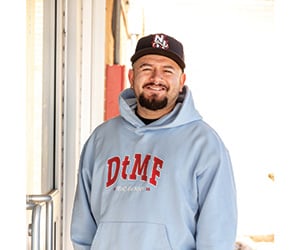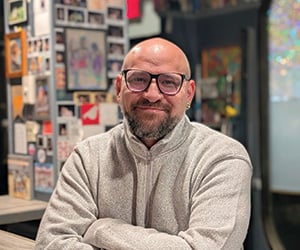Essay: In with cultural humility, out with cultural competence
 We should replace the term “cultural competence” with “cultural humility.” Cultural competence is a term frequently used in diversity, equity and inclusion training, but it is inherently flawed.
We should replace the term “cultural competence” with “cultural humility.” Cultural competence is a term frequently used in diversity, equity and inclusion training, but it is inherently flawed.
At the IDEA Center at Plymouth State University, where I serve as director, we’ve already made an effort to avoid using cultural competence in our language. I feel strongly about this, and I’ll tell you why.
Cultural competence is generally meant to signify that someone has obtained enough knowledge about a culture to respectfully navigate its myriad idiosyncrasies and interact with people from that culture. It’s like saying you’ve earned a driver’s license, but the car is North African Bedouin culture, for example. The implication is you can now drive their car, which is as problematic as it sounds. Essentially, it promotes the idea that when one eventually arrives at a certain level of knowledge, personal growth and accountability are no longer needed.
Cultural humility, on the other hand, promotes the idea that the more we learn about another person’s experience, the humbler we become. It’s a concept that embraces lifelong learning and seeks to avoid any misplaced confidence or false sense of superiority. The more we learn about someone else’s culture, we might begin to recognize that we still have a lot more to learn.
I can speak from personal experience. Several years ago, after graduating from college, I had the opportunity to live in Montevideo, Uruguay, for a full year as a student leader with a nonprofit organization. Uruguayan culture is very different from American culture, and while I identify as Latino, I am still very much an American, having grown up in the United States.
That said, this was not my first time in Uruguay. Before I had the opportunity to volunteer with this nonprofit organization full-time, I had the opportunity to live and work for this same organization for six weeks during one of my summers in college. During that experience, my entire team was in the cultural “honeymoon” phase. The Uruguayans loved us, and we loved them. Everyone in our organizations got along well, and we had no issues working together.
When I returned a year later for a full-time student leadership program, the story was completely different. I came back with the expectation that I had a significant amount of knowledge to provide the Uruguayans about how to run their organization. I also thought that, because I had traveled to the country before, I was an expert on their culture. I also had a bachelor’s degree while most of them were still working toward theirs. I had been a leader in my organization in the U.S., so I assumed my leadership skills would translate seamlessly into the organization in Uruguay.
Unfortunately, having a bachelor’s degree and visiting the country for a summer didn’t make me an expert on Uruguayan leadership styles. To Uruguayans, my leadership skills were viewed as authoritarian and not collaborative. They had expected us to come to serve and partner with them in their work.
We also viewed time very differently from one another. As Americans, we were used to scheduling our days full of meetings for 30 minutes, maybe up to one hour. I had been used to scheduling four to five meetings a day. In Uruguay, if you plan to meet with someone, there is a good chance that they are the only person you will be meeting with that day. If you cut a meeting short to get to another meeting, that would be considered rude.
Uruguay is generally a people-oriented culture, while the United States is generally more of a time-oriented culture. I had heard about people-oriented cultures versus time-oriented cultures during an Intercultural Communication class in college. I honestly thought that people-oriented cultures sounded much nicer than time-oriented cultures, but I also harbored the biased notion that countries with time-oriented cultures were superior.
When I experienced living in a people-oriented culture firsthand, however, my task-driven brain was challenged tremendously because I felt like I couldn’t get anything done. Ultimately, I learned it’s not about which culture is better than another, but it is about appreciating and respecting another’s culture without judgment.
The IDEA Center at Plymouth State University recently hosted a wonderful week of programming in honor of International Education Week to promote this idea of cultural humility. We started the week off with our annual Parade of Flags. This event allows students, faculty and staff to proudly display the flags of their home countries while parading around our campus.
Next, we featured a study abroad film festival hosted by our Global Education Office. This new office on campus promotes study-abroad opportunities for PSU students in partnership with the University of New Hampshire.
During the week, we hosted our largest event of the year, PSU’s third annual Multicultural Fair, which represented nearly 25 different cultures. The college community showcases their cultures. Many people provide food, give presentations and display significant items that are meaningful to them. Attendees often remark about how they weren’t aware of how many different cultures exist on our campus.
One of our political science faculty members, Dr. Filiz Ruhm, gave a presentation about her home country, Turkey. Dr. Ruhm’s presentation was eye-opening and engaging. That same day, we hosted a celebration for our many international employees at PSU. The week ended with a Circassian dinner hosted by a student of Circassian descent and one of our IDEA ambassadors, Laylah Tsay, who is graduating with an Adventure Education degree in May 2025. The Circassian people are an indigenous peoples group from Russia who were displaced during the Circassian Genocide in the 19th century.
These activities serve to introduce our students to intercultural perspectives and produce more graduates who will be working cross-culturally, with the mentality of our university motto “Ut Prosim,” That I May Serve.
To truly prepare our students and community for an increasingly interconnected and diverse world, we must move beyond the static concept of cultural competence. Cultural humility calls us to engage in a lifelong journey of learning, unlearning and co-creation with others — one that resists assumptions of expertise and embraces vulnerability and growth. By adopting this mindset, our campus reaffirms that respect for other cultures is not an endpoint but an enduring commitment.
This article was featured in 603 Diversity.
603 Diversity’s mission is to educate readers of all backgrounds about the exciting accomplishments and cultural contributions of the state’s diverse communities, as well as the challenges faced and support needed by those communities to continue to grow and thrive in the Granite State.













